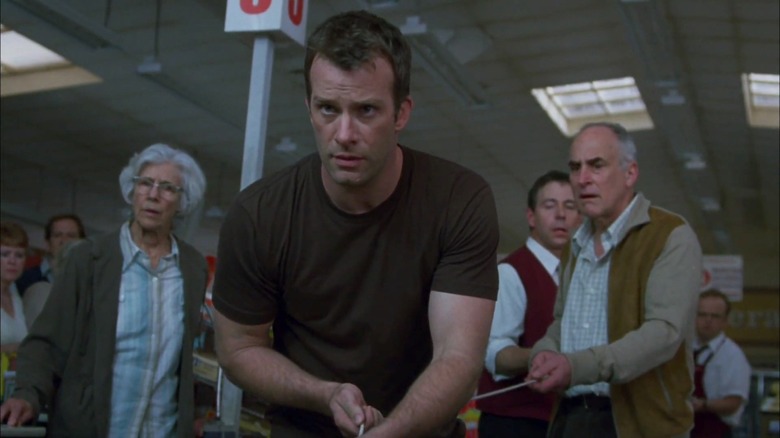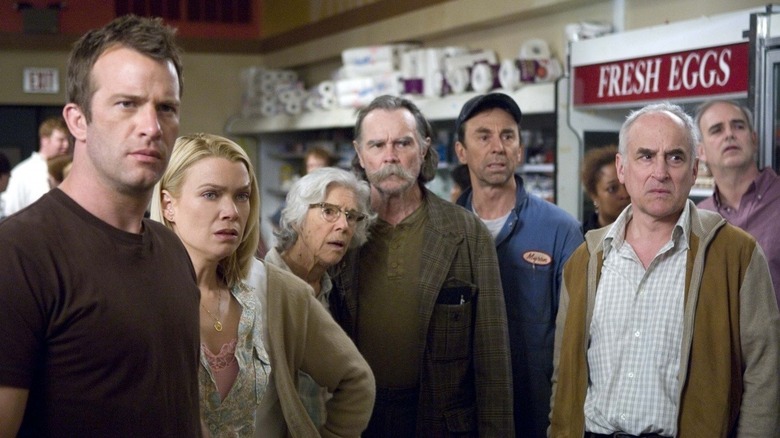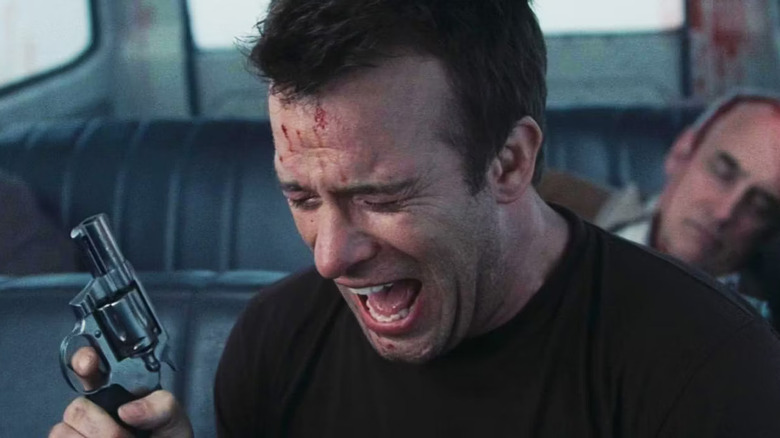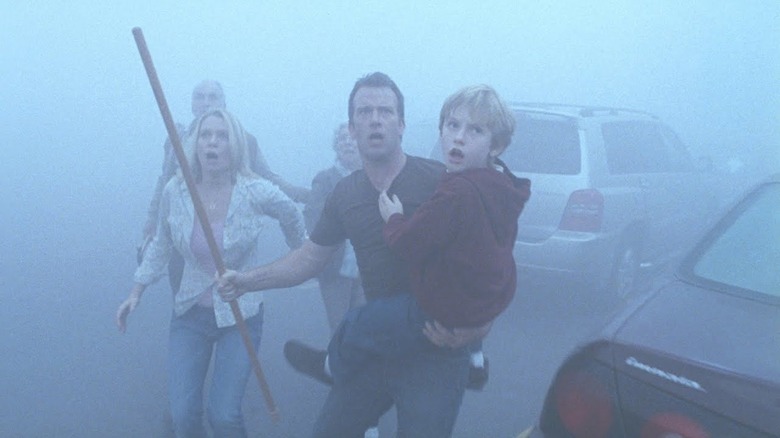Why Stephen King Defends The Mist's 'Terrific' Yet Divisive Ending
Writer and director Frank Darabont is known for his celebrated adaptations of Stephen King's "The Shawshank Redemption" and "The Green Mile," but his film version of King's novella "The Mist" has one of the most harrowing and divisive endings in contemporary horror cinema. "The Mist" follows the tough everyman David Drayton and his young son Billy when they go to a supermarket after a severe thunderstorm in the lakeside town of Bridgton, Maine. They become trapped in the store by a strange, overpowering mist that hides deadly monsters.
The singular setting of the grocery store serves as a microcosm for society, particularly how conflicting groups of people — level-headed seekers of justice, hot-tempered aggressors, or holy rollers — instill fears in others or try to work together. "The Mist" is a searing portrayal of humanity's capacity to unite as a team or tear each other apart.
If anything, "The Mist" holds even more resonance today as the gulf between political spectrums and world viewpoints widen amidst the pandemic. The whole thing culminates in perhaps the film's scariest scene – its gut-wrenching and hotly-debated ending, which vastly differs from that for King's novella.
The difference between the endings
Stephen King ends "The Mist" with David Drayton possibly hearing civilization on the radio and telling his son the words: "One of them is Hartford, the other is hope." King told Yahoo! Entertainment in 2017 how he felt about Frank Darabont's own radical and depressing vision for the denouement:
"When Frank was interested in 'The Mist,' one of the things that he insisted on was that it would have some kind of an ending, which the story doesn't have — it just sort of peters off into nothing, where these people are stuck in the mist, and they're out of gas, and the monsters are around, and you don't know what's going to happen next. When Frank said that he wanted to do the ending that he was going to do, I was totally down with that."
In the film, Drayton, his son, and other friends escape the supermarket and drive into the ominous mist until they run out of gas. Rather than fight the veiled monsters, they make the despairing decision to end their lives. The only problem is they do not have enough bullets for everyone in the car.
Darabont's camera travels across their somber faces in tense close-ups while they accept their grave choice. Next, he cuts to a wide shot of the car in the middle of the mist as the shots bang out in quick succession. When he returns to the inside of the car, the sight of the bloodied, dead bodies behind the traumatized Drayton is absolutely chilling. Then, in a cruel twist of fate, Drayton emerges from the car to find the mist clearing and military tanks coming to the rescue.
An anti-Hollywood ending
Stephen King defended the film's grim ending as "terrific" because it was "so anti-Hollywood — anti-everything, really! It was nihilistic. I liked that." In the oral history of the "The Mist" for /Film, Frank Darabont recalls his hesitation to change King's original ending. He wanted to make sure the author approved of the new direction he was taking his story:
"I put it in his hands. And he wrote back and he said, 'I read it. I love your ending. I'm sorry I didn't think of it, because I would've written that instead.' [...] [H]e said, 'We need movies that dare to piss people off.'"
Darabont's ending whallops the audience with a greater punch than King originally envisioned. It is a daring subversion of Hollywood expectations because the hero makes the wrong choice and ultimately fails. Most films, even in the horror or apocalypse genres, offer the audience somewhat of an uplifting conclusion. Darabont's bleak ending is more memorable because, as he says, "It's not tied up in a nice bow and there's just this reassuring happy Hallmark bumper sticker thing."
The legacy of the ending
Stephen King may have loved Frank Darabont's changes, but initially audiences did not react the same way. In his interview with Yahoo! Entertainment, King recalled how "[T]he critics and fans both kind of excoriated him. [...] And now, when you read retrospective pieces about 'The Mist,' people are, 'Wow, that's one of the great ones.' They like it. They just had to get used to it." Critics in 2007 described "The Mist" as "endless torture and [a series of] inhumanly cruel jokes" (via NJ.com) and "twisted to cynical and dispiriting ends" (via Newsday).
Part of the divisive reception was due to the film's ill-timed Thanksgiving weekend release, when "everybody has a great feast and then, as a family, goes to the movies. [...] People want to go see 'Elf.' They want to see Christmas movies. They don't want to see flesh-eating tentacles and this hopeless, despair-filled movie," Darabont argues in /Film's oral history.
Darabont wanted the ending to "The Mist" to be as brutal as those for horror classics like "Night of the Living Dead" (where the hero is mistaken for a zombie and killed) or the ending of "The Thing" (where the characters resign to their fate of freezing to death, with the monster possibly still inside one of them). Yet, at the same time, /Film writer Joshua Meyer shrewdly points out in his dissection of the scariest Stephen King scenes that the dismal conclusion of "The Mist" is "almost life-affirming" because it implores audiences to never give up. /Film writer Jeremy Smith also elaborates on the the importance of hope in "The Mist." Through Drayton's fatal error, viewers learn they should never succumb to panic and hysteria, even when their destiny is uncertain and everything seems doomed.



